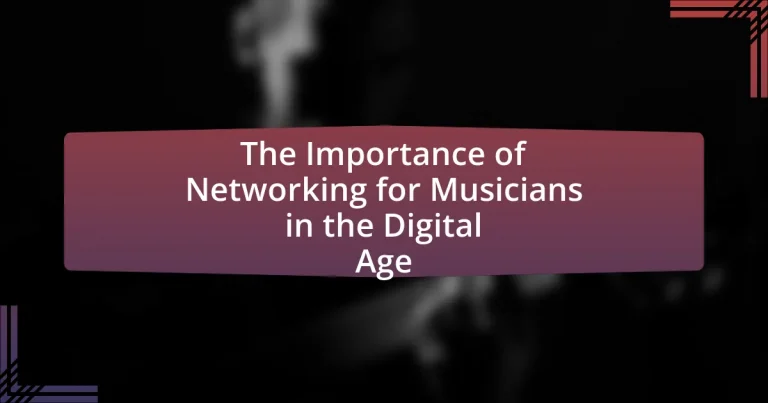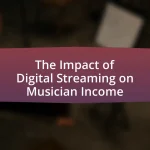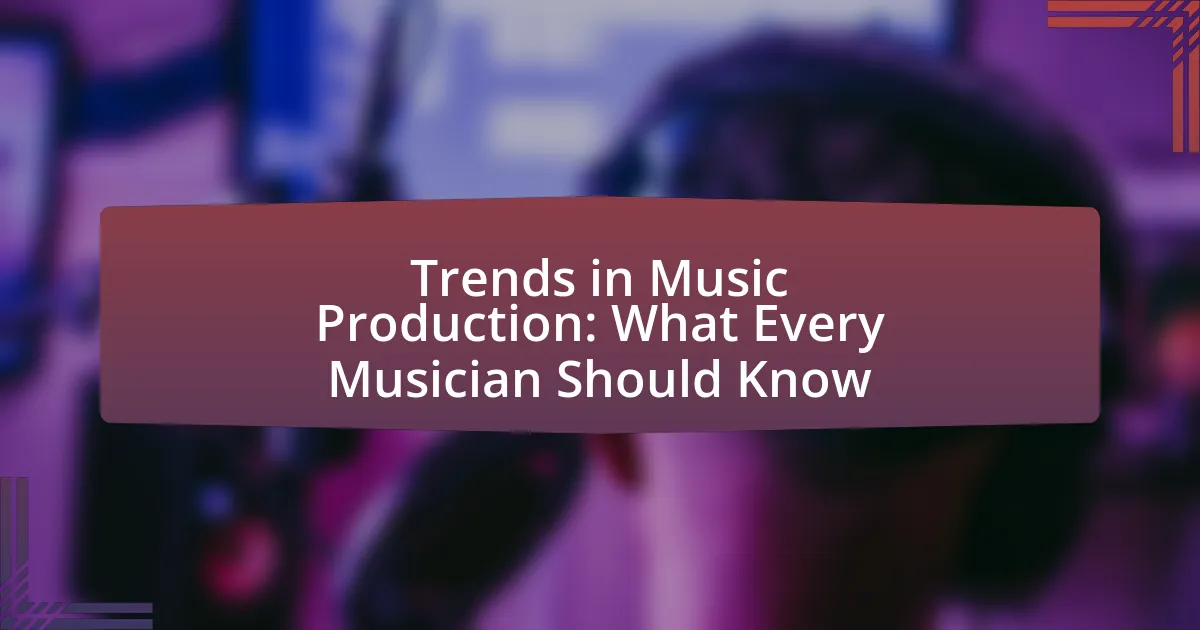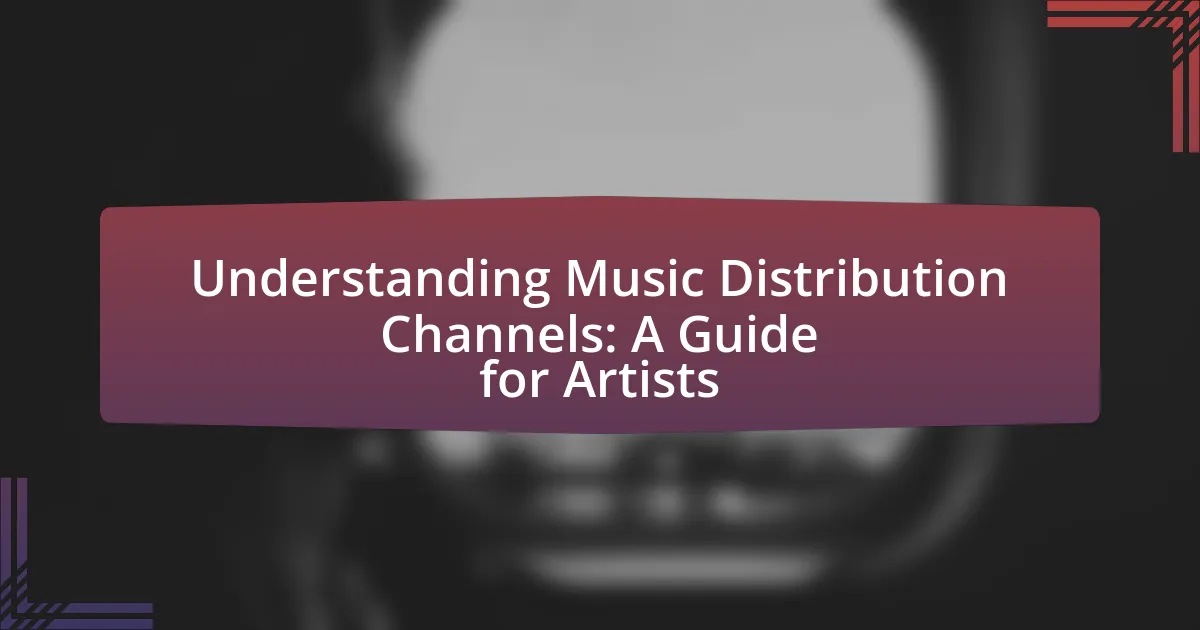The article focuses on the significance of networking for musicians in the digital age, emphasizing its role in accessing opportunities, collaborations, and audiences. It highlights how digital platforms and social media have transformed networking, enabling musicians to connect with industry professionals and fans globally. Key digital platforms such as SoundCloud, Instagram, and LinkedIn are discussed for their effectiveness in enhancing visibility and fostering relationships. The article also addresses the challenges musicians face in a competitive landscape and offers strategies for effective networking, including maintaining professional relationships and leveraging social media. Overall, it underscores the long-term benefits of networking for career growth and brand development in the music industry.
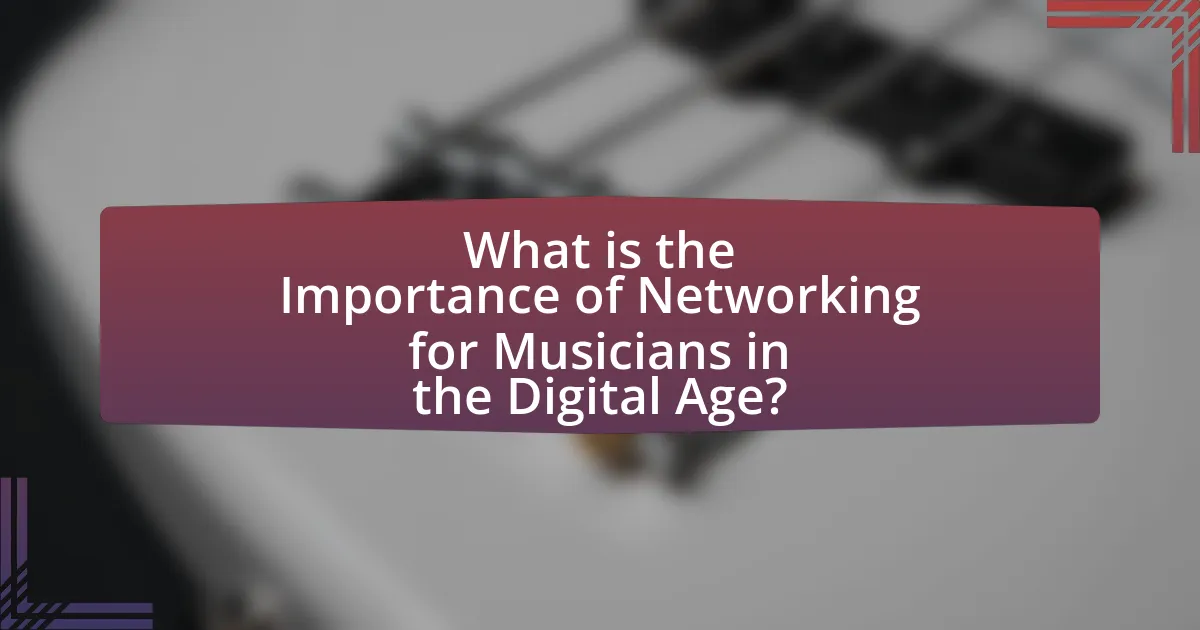
What is the Importance of Networking for Musicians in the Digital Age?
Networking is crucial for musicians in the digital age as it facilitates access to opportunities, collaborations, and audiences. In an era where social media and online platforms dominate, musicians can connect with industry professionals, fellow artists, and fans globally, enhancing their visibility and career prospects. For instance, a study by the Berklee College of Music found that 70% of musicians attribute their success to networking, highlighting its role in securing gigs, collaborations, and promotional support. This interconnectedness allows musicians to leverage digital tools for marketing and distribution, ultimately leading to greater success in a competitive landscape.
How has the digital age transformed networking for musicians?
The digital age has transformed networking for musicians by providing unprecedented access to global audiences and industry professionals through online platforms. Social media, streaming services, and music-sharing websites enable musicians to connect directly with fans, collaborate with other artists, and promote their work without the need for traditional gatekeepers like record labels. For instance, platforms like Instagram and TikTok have become essential tools for musicians to showcase their talent and build a following, with TikTok alone generating viral music trends that can lead to significant commercial success. Additionally, online communities and forums allow musicians to share resources, advice, and opportunities, fostering a collaborative environment that was less accessible before the digital era.
What are the key digital platforms that facilitate networking for musicians?
Key digital platforms that facilitate networking for musicians include SoundCloud, Bandcamp, Facebook, Instagram, and LinkedIn. SoundCloud allows musicians to share their music and connect with other artists and fans, boasting over 76 million users. Bandcamp provides a platform for artists to sell their music directly to fans, fostering community engagement. Facebook and Instagram serve as social media hubs where musicians can promote their work, engage with audiences, and network with industry professionals. LinkedIn offers a more professional networking environment, enabling musicians to connect with industry contacts and potential collaborators. These platforms collectively enhance visibility and opportunities for musicians in the digital landscape.
How do social media and streaming services impact musician connections?
Social media and streaming services significantly enhance musician connections by providing platforms for direct interaction and audience engagement. These digital tools allow musicians to share their work, collaborate with other artists, and build a fanbase without geographical limitations. For instance, platforms like Instagram and TikTok enable musicians to showcase their talent and connect with fans in real-time, while streaming services like Spotify and Apple Music facilitate access to a global audience, increasing visibility and opportunities for collaboration. According to a 2021 report by the International Federation of the Phonographic Industry, 70% of music listeners discover new artists through streaming platforms, highlighting the critical role these services play in expanding musician networks.
Why is networking essential for musicians today?
Networking is essential for musicians today because it facilitates opportunities for collaboration, exposure, and career advancement. In the digital age, musicians rely on connections to access platforms, gain visibility, and build a fanbase. For instance, a study by the Berklee College of Music found that 85% of music industry jobs are filled through networking, highlighting its critical role in career development. Additionally, social media platforms enable musicians to connect with industry professionals and fellow artists, further enhancing their reach and influence.
What opportunities does networking create for musicians?
Networking creates opportunities for musicians by facilitating collaborations, increasing visibility, and providing access to industry resources. Through networking, musicians can connect with producers, other artists, and influencers, which can lead to joint projects that enhance their creative output and reach. Additionally, networking events and platforms allow musicians to showcase their work to a broader audience, thereby increasing their chances of gaining followers and securing performance opportunities. According to a study by the Berklee College of Music, 70% of musicians reported that networking played a crucial role in their career advancement, highlighting its significance in the music industry.
How does networking influence a musician’s career growth?
Networking significantly influences a musician’s career growth by providing access to opportunities, collaborations, and industry insights. Through networking, musicians can connect with producers, promoters, and other artists, which can lead to gigs, record deals, and exposure to wider audiences. For instance, a study by the Berklee College of Music found that 70% of musicians attribute their career advancements to networking efforts, highlighting its critical role in securing opportunities that may not be available through traditional means. Additionally, networking allows musicians to stay informed about industry trends and best practices, further enhancing their ability to adapt and thrive in a competitive landscape.
What challenges do musicians face in networking within the digital landscape?
Musicians face several challenges in networking within the digital landscape, primarily due to oversaturation and competition. The digital space is crowded with countless artists, making it difficult for individual musicians to stand out and gain visibility. According to a 2021 report by the International Federation of the Phonographic Industry, over 60,000 new tracks are uploaded to streaming platforms daily, highlighting the intense competition for attention.
Additionally, musicians often struggle with building authentic connections in an environment dominated by algorithms and automated interactions. This reliance on technology can hinder genuine relationship-building, which is crucial for collaboration and support. A study by the Berklee College of Music found that personal connections significantly impact a musician’s career growth, yet many artists find it challenging to foster these connections online.
Moreover, the rapid evolution of digital tools and platforms can overwhelm musicians, who may lack the technical skills or resources to effectively utilize them for networking purposes. This technological barrier can limit their ability to engage with audiences and industry professionals, further complicating their networking efforts.
How can musicians overcome barriers to effective networking?
Musicians can overcome barriers to effective networking by leveraging digital platforms and social media to connect with industry professionals and peers. Utilizing platforms like Instagram, LinkedIn, and SoundCloud allows musicians to showcase their work, engage with audiences, and build relationships without geographical limitations. Research indicates that 70% of jobs are found through networking, highlighting the importance of establishing connections in the music industry. Additionally, attending virtual events and webinars can provide opportunities for musicians to meet industry insiders and learn from their experiences, further enhancing their networking capabilities.
What role does competition play in networking for musicians?
Competition plays a significant role in networking for musicians by driving them to enhance their skills and expand their connections. In a saturated music industry, musicians often face numerous peers vying for the same opportunities, which compels them to actively seek collaborations, attend events, and engage with industry professionals to stand out. This competitive environment fosters a culture of innovation and creativity, as musicians are motivated to differentiate themselves through unique styles and networking strategies. Research indicates that musicians who actively network in competitive settings are more likely to secure gigs and collaborations, as they build relationships that can lead to referrals and support within the industry.
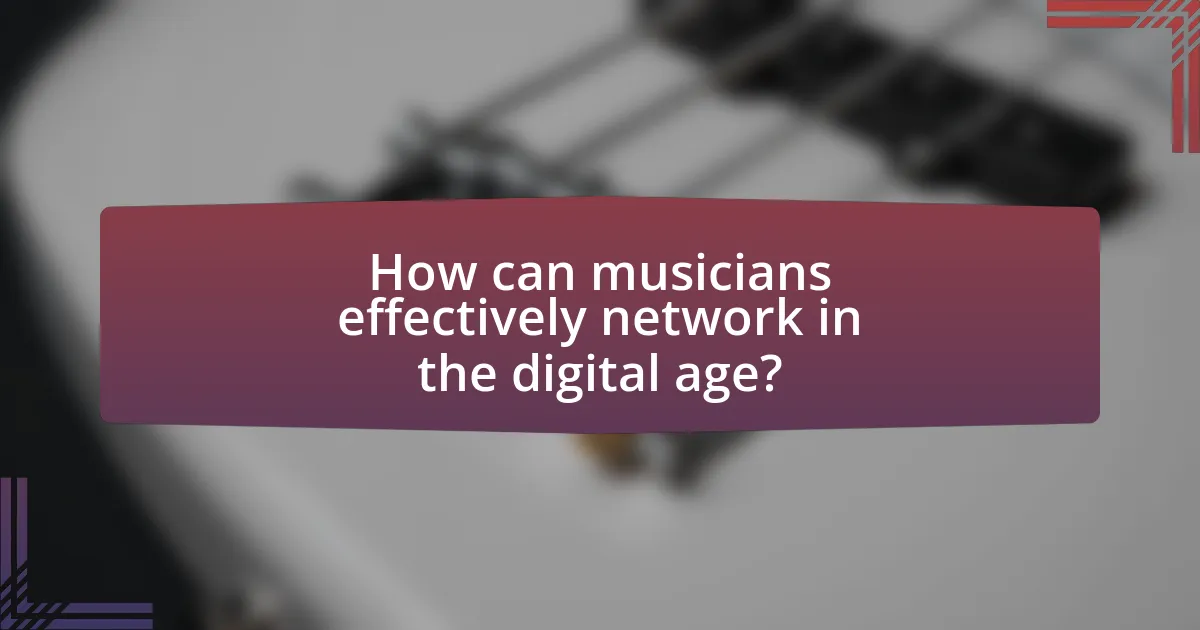
How can musicians effectively network in the digital age?
Musicians can effectively network in the digital age by leveraging social media platforms, engaging in online communities, and utilizing music collaboration tools. Social media platforms like Instagram, Twitter, and TikTok allow musicians to showcase their work, connect with fans, and interact with industry professionals. Engaging in online communities, such as music forums and Facebook groups, enables musicians to share experiences, seek advice, and collaborate with peers. Additionally, tools like SoundCloud and BandLab facilitate collaboration by allowing musicians to share tracks and work together remotely. These methods are supported by the fact that 70% of music industry professionals use social media to discover new talent, highlighting the importance of an online presence for networking.
What strategies can musicians use to build their network online?
Musicians can build their network online by actively engaging on social media platforms, collaborating with other artists, and participating in online music communities. Engaging on platforms like Instagram, Twitter, and TikTok allows musicians to showcase their work and connect with fans and industry professionals. Collaborating with other artists not only expands their reach but also introduces them to new audiences, as seen in successful partnerships like those between artists in the hip-hop and pop genres. Additionally, participating in online music forums and communities, such as SoundCloud and Bandcamp, enables musicians to share their music, receive feedback, and network with peers, which is crucial for career growth in the digital age.
How can musicians leverage social media for networking?
Musicians can leverage social media for networking by actively engaging with their audience and industry professionals through platforms like Instagram, Twitter, and Facebook. By sharing content such as music releases, behind-the-scenes footage, and personal stories, musicians can build a loyal fan base and attract the attention of industry influencers. According to a 2021 report by the International Federation of the Phonographic Industry, 70% of music consumers discover new artists through social media, highlighting its effectiveness as a networking tool. Additionally, participating in online collaborations and joining music-related groups can facilitate connections with other musicians and industry stakeholders, further enhancing networking opportunities.
What are the best practices for engaging with industry professionals?
The best practices for engaging with industry professionals include building genuine relationships, being prepared with a clear value proposition, and utilizing social media effectively. Building genuine relationships involves networking authentically, attending industry events, and following up with contacts to maintain connections. Being prepared with a clear value proposition means understanding what you can offer to industry professionals, such as unique skills or insights, which can facilitate meaningful conversations. Utilizing social media effectively entails sharing relevant content, engaging with industry leaders, and participating in discussions to increase visibility and demonstrate expertise. These practices are supported by research indicating that personal connections and strategic online presence significantly enhance networking success in the music industry.
How can musicians maintain and nurture their professional relationships?
Musicians can maintain and nurture their professional relationships by consistently engaging with their network through communication, collaboration, and support. Regularly reaching out via social media, emails, or phone calls helps to keep connections alive and demonstrates genuine interest. Collaborating on projects or performances fosters deeper bonds and mutual respect, while offering support, such as promoting peers’ work or attending their events, strengthens these relationships. Research indicates that strong professional networks can lead to increased opportunities and career advancement, highlighting the importance of nurturing these connections in the competitive music industry.
What tools can musicians use to manage their networking efforts?
Musicians can use social media platforms, professional networking sites, and music collaboration tools to manage their networking efforts. Social media platforms like Instagram, Facebook, and Twitter allow musicians to connect with fans and industry professionals, share their work, and promote events. Professional networking sites such as LinkedIn enable musicians to build relationships with industry contacts and showcase their skills. Additionally, music collaboration tools like Soundtrap and Splice facilitate connections with other musicians for joint projects, enhancing networking opportunities. These tools are essential for musicians to expand their reach and foster valuable relationships in the digital age.
How often should musicians reach out to their contacts?
Musicians should reach out to their contacts at least once every few months. Regular communication helps maintain relationships and keeps musicians top-of-mind for opportunities. Research indicates that consistent networking can lead to increased collaboration and visibility in the industry, as relationships often require nurturing to remain beneficial.
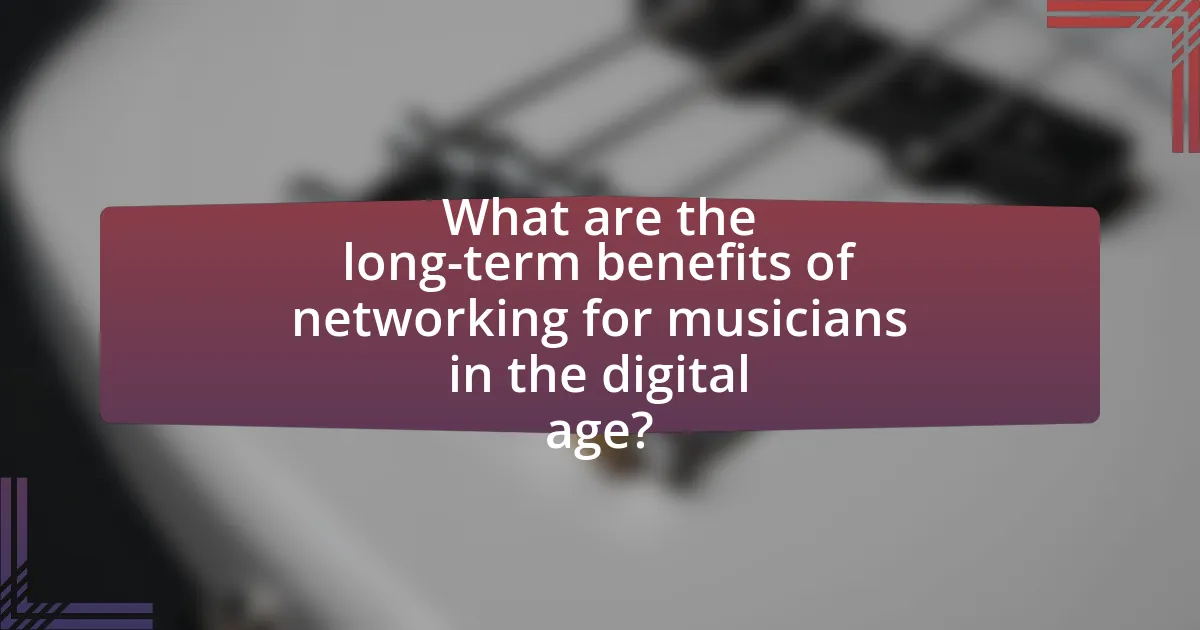
What are the long-term benefits of networking for musicians in the digital age?
Networking provides musicians in the digital age with long-term benefits such as increased visibility, collaboration opportunities, and access to industry resources. Increased visibility arises from connections with other artists, influencers, and industry professionals, which can lead to greater exposure through shared platforms and audiences. Collaboration opportunities enhance creativity and innovation, as musicians can work together on projects, leading to diverse musical styles and broader fan bases. Access to industry resources, including funding, promotional tools, and mentorship, is facilitated through networking, allowing musicians to navigate the complexities of the music industry more effectively. These benefits are supported by data indicating that artists who actively network are more likely to achieve commercial success and sustain their careers over time.
How does networking contribute to a musician’s brand development?
Networking significantly contributes to a musician’s brand development by facilitating connections with industry professionals, fans, and other artists. These connections can lead to collaborative opportunities, increased visibility, and access to resources that enhance a musician’s reputation. For instance, a study by the Berklee College of Music found that 85% of music industry jobs are filled through networking, highlighting its critical role in career advancement. Additionally, musicians who actively engage in networking can leverage social media platforms to build a loyal fan base, further solidifying their brand identity in a competitive market.
What impact does a strong network have on a musician’s visibility?
A strong network significantly enhances a musician’s visibility by providing access to broader audiences and industry opportunities. When musicians connect with other artists, producers, and influencers, they can leverage these relationships to promote their work, gain referrals, and secure performances. For instance, a study by the Berklee College of Music found that musicians with extensive networks are more likely to receive media coverage and collaboration offers, which directly increases their exposure. This interconnectedness allows musicians to tap into established fan bases and platforms, amplifying their reach in a competitive digital landscape.
How can networking lead to collaborative opportunities for musicians?
Networking can lead to collaborative opportunities for musicians by facilitating connections with other artists, producers, and industry professionals. These connections often result in joint projects, performances, and creative exchanges that enhance artistic growth and visibility. For instance, musicians who attend industry events or engage on social media platforms can meet potential collaborators, leading to partnerships that may not have been possible otherwise. Research indicates that 70% of jobs are found through networking, highlighting its critical role in creating opportunities, including in the music industry.
What practical tips can musicians follow to enhance their networking skills?
Musicians can enhance their networking skills by actively participating in music industry events, utilizing social media platforms effectively, and collaborating with other artists. Attending events such as concerts, workshops, and music festivals allows musicians to meet industry professionals and fellow artists, fostering valuable connections. Social media platforms like Instagram, Twitter, and LinkedIn enable musicians to showcase their work, engage with fans, and connect with industry influencers. Collaborating with other artists not only expands a musician’s reach but also creates opportunities for cross-promotion and shared audiences. These strategies are supported by the fact that networking is crucial for career advancement in the music industry, as evidenced by studies showing that personal connections often lead to job opportunities and collaborations.
How can musicians effectively introduce themselves in networking situations?
Musicians can effectively introduce themselves in networking situations by clearly stating their name, genre, and a unique aspect of their music or experience. This concise introduction captures attention and provides essential information that can lead to further conversation. For instance, a musician might say, “Hi, I’m Alex, a jazz guitarist who blends traditional styles with modern influences.” This approach not only identifies the musician but also highlights their unique selling point, making them memorable. Research indicates that first impressions are formed within seconds, emphasizing the need for a strong and engaging introduction in networking contexts.
What common mistakes should musicians avoid when networking?
Musicians should avoid being overly self-promotional when networking. This mistake can alienate potential connections, as it often comes across as insincere or pushy. Instead, musicians should focus on building genuine relationships by actively listening and engaging with others in the industry. Research indicates that networking is most effective when it emphasizes mutual benefit rather than one-sided promotion, highlighting the importance of collaboration and shared interests in the music community.
